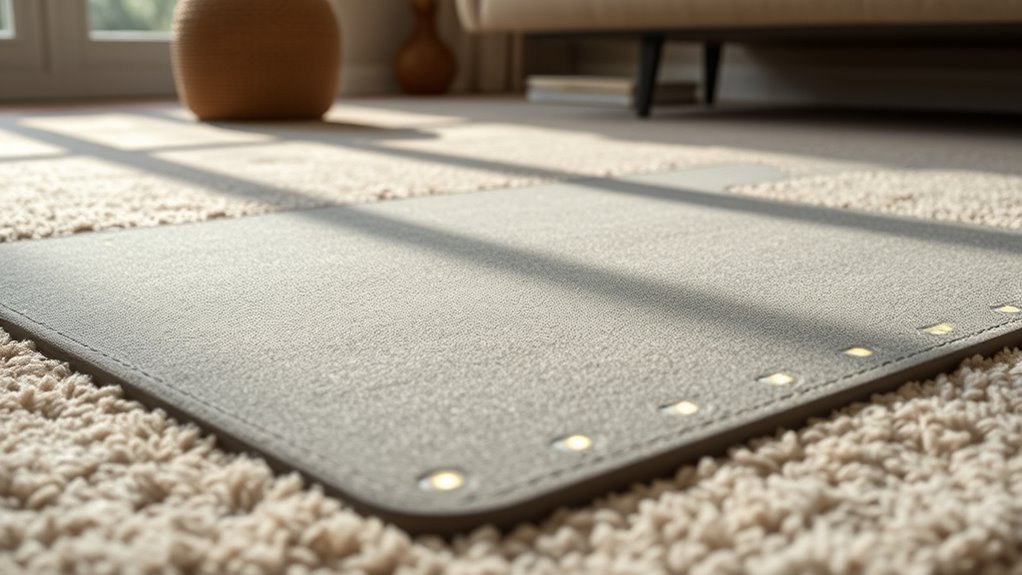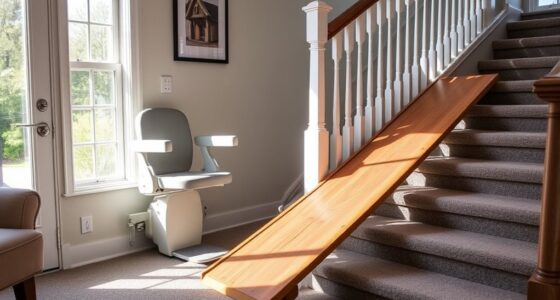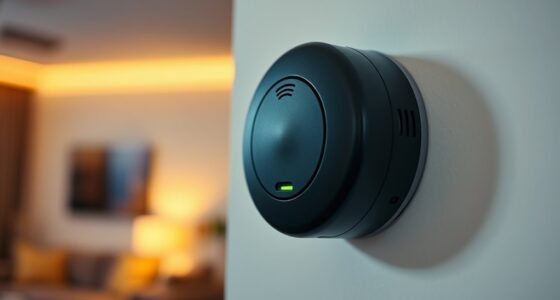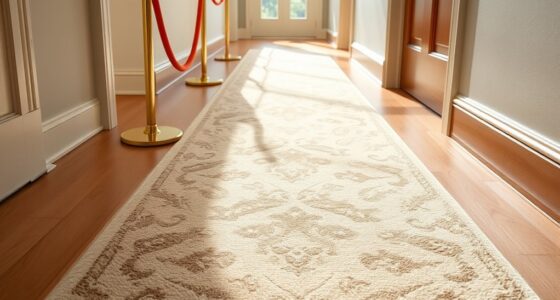Pressure-sensitive floor sensors provide a discreet way to monitor your loved one’s movements and detect sudden falls or inactivity. They can automatically alert you or emergency services when something unusual happens, allowing quick assistance that might save their life. These sensors work invisibly within your home, offering peace of mind and a safer environment. To discover how these advanced safety tools can make a real difference, keep exploring the options available.
Key Takeaways
- Detect falls instantly and trigger automatic alerts to caregivers or emergency services for rapid assistance.
- Monitor inactivity patterns to identify health issues or emergencies before critical incidents occur.
- Provide continuous, unobtrusive safety oversight, ensuring help is available without intruding on daily life.
- Enable early detection of mobility decline, prompting timely medical intervention and preventing accidents.
- Offer peace of mind by discreetly safeguarding loved ones, promoting independence with enhanced safety measures.
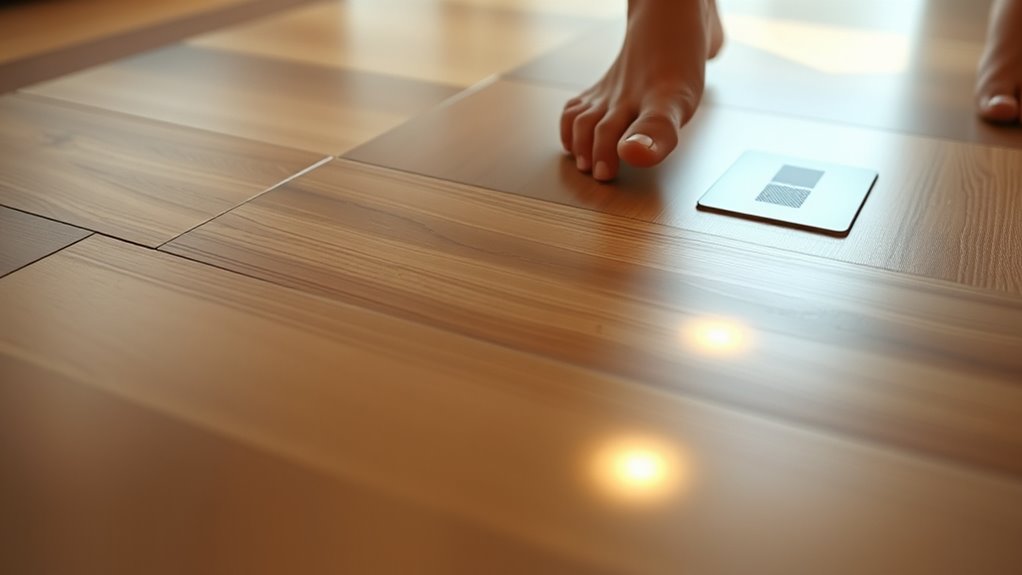
Pressure-sensitive floor sensors are innovative devices that detect movement and weight changes on a surface. When installed in key areas of your loved one’s home, these sensors can provide an extra layer of security, especially for seniors. You might not always be there to monitor their safety, but these sensors work quietly in the background, giving you peace of mind. They are designed to recognize when someone steps onto or leaves a designated area, making them ideal for elderly safety. With fall detection capabilities, they can identify sudden or unusual movements that suggest a fall has occurred. This immediate detection is vital because falls are a leading cause of injury among older adults, often resulting in serious health complications.
Imagine your loved one getting up in the middle of the night or moving around the house. The pressure-sensitive sensors monitor their movements continuously, alerting you if they experience a fall or if they remain in one spot for an unusually long period, which could indicate a problem. These sensors are sophisticated enough to differentiate between normal activity and potential emergencies, reducing false alarms. If a fall is detected, the system can automatically notify family members, caregivers, or emergency services, ensuring prompt assistance. This rapid response could be the difference between a minor injury and a life-threatening situation.
Beyond fall detection, these sensors enhance elderly safety by providing valuable data on daily activity patterns. You can see if your loved one is moving less than usual, which might signal health issues or mobility problems that need attention. This constant monitoring allows you to intervene early, potentially preventing accidents before they happen. Additionally, pressure-sensitive floor sensors are discreet and unobtrusive, blending seamlessly into your loved one’s environment without making them feel watched or uncomfortable.
In essence, pressure-sensitive floor sensors act as invisible guardians, continuously watching over your loved ones. They empower you to respond quickly to emergencies, particularly falls, which are common among seniors. By adding this technology to your loved one’s home, you’re not only safeguarding their physical well-being but also giving yourself reassurance that help is just a moment away. It’s a proactive approach to elderly safety that respects independence while providing critical safety nets. With these sensors in place, you can rest easier knowing that when your loved one moves or falls, help is on its way—potentially saving their life.

Vive Wireless Floor Alarm by Vive – Motion Sensor Kit for Elderly Dementia Patients – Weight Movement Pressure Pad Detector – Automatic Health Alert System for Mat
VIVE WIRELESS PAGER INCLUDED: Up to 10 Vive sensors can be synced to a single pager at the…
As an affiliate, we earn on qualifying purchases.
As an affiliate, we earn on qualifying purchases.
Frequently Asked Questions
How Long Do Pressure-Sensitive Floor Sensors Typically Last?
Pressure-sensitive floor sensors typically last around 5 to 10 years, depending on usage and environment. To guarantee they stay reliable, you should perform regular sensor maintenance and sensor calibration. Proper maintenance helps prevent wear and tear, while calibration keeps the sensors accurate. By staying proactive, you can maximize their lifespan and trust that they’ll alert you promptly if someone needs help, providing peace of mind.
Are These Sensors Safe for Pets and Children?
Imagine a vigilant guardian quietly watching over your home. Pressure-sensitive floor sensors are designed with pet safety in mind, so your furry friends can roam freely without worry. Their sensor durability ensures they stand strong against daily activity, making them a safe choice for children and pets alike. You can trust these sensors to protect your loved ones, providing peace of mind with every step they take.
What Is the Installation Process for Pressure-Sensitive Floor Sensors?
You start by reviewing the installation guidelines provided by the manufacturer to guarantee proper setup. Next, you lay out the sensor placement areas, making sure they cover key zones like walkways or beds. During installation, you calibrate the sensors to detect weight thresholds accurately, adjusting settings as needed. Follow the calibration instructions carefully, then test the sensors to confirm they respond correctly, ensuring reliable safety monitoring for loved ones.
Can Sensors Differentiate Between Humans and Pets?
You wonder if sensors can differentiate between humans and pets, and yes, many advanced pressure-sensitive floor sensors include pet detection features. These sensors analyze weight patterns, sizes, and movement to reduce false alarms, ensuring you’re alerted only when necessary. By distinguishing pets from humans, they help prevent unnecessary alerts, allowing you to focus on genuine emergencies and keep your loved ones safe without the worry of false alarms.
How Do Sensors Alert Caregivers in Emergency Situations?
You rely on pressure-sensitive floor sensors to alert caregivers during emergencies. When calibrated correctly, these sensors detect unusual weight shifts and send instant notifications through connected devices. They’re designed to prevent false alarms by filtering out normal movements, ensuring you’re only alerted in genuine emergencies. This quick, accurate response can be vital in life-threatening situations, allowing you to act swiftly and provide help when it’s needed most.

AltumView Sentinare Fall Detection & Activity Sensor, Privacy-Preserving Videoless Stick Figure View, Action Statistics, Medical Alert
NO MONTHLY FEE: All basic features are available without monthly fee.
As an affiliate, we earn on qualifying purchases.
As an affiliate, we earn on qualifying purchases.
Conclusion
By installing pressure-sensitive floor sensors, you could dramatically improve safety at home. These sensors can detect falls or unusual inactivity instantly, potentially saving lives. Did you know that falls are the leading cause of injury among seniors, with over 3 million emergency visits annually? With such technology, you’re proactively protecting your loved ones, giving both peace of mind and a essential lifeline when it matters most. It’s a simple step that could truly make a life-saving difference.

120 DB Loud Door and Window Open Alarm Sensor 3 Pack for Kids, Dementia Patients Safety, Burglar Anti-Theft Wireless Security Alarms Keep Your Home, Pool, Cabinet, Business Safe
LOUD ALARM: The 120 DB security alarm is perfect for signaling to you when there is an unwanted…
As an affiliate, we earn on qualifying purchases.
As an affiliate, we earn on qualifying purchases.
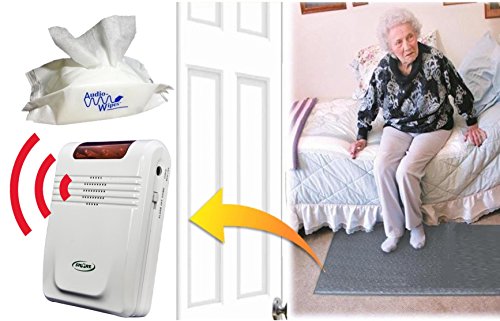
Smart Caregiver Economy Cordless Fall Monitor and Cordless Floor Mat Sensor Bundle with Pouch of 30 Cleaning Wipes
ECONOMY CordLess FALL PREVENTION ALARM: Provides affordable and effective cord-free wireless monitoring with a range up to 300…
As an affiliate, we earn on qualifying purchases.
As an affiliate, we earn on qualifying purchases.
